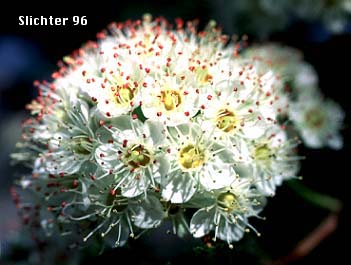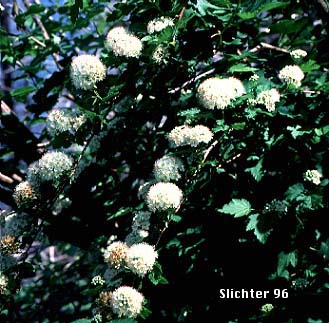

 Photo at right of ninebark along
the headwaters of Fairview Creek in Gresham, OR.
Photo at right of ninebark along
the headwaters of Fairview Creek in Gresham, OR.
Ninebark is an attractive shrub with several to many spreading to erect branches from 2-4 meters high. The leaves are simple with ternate venation (3 main veins) with the blades ovate to heart-shaped and with 3-5 lobes which are incised less than half the length (See the photos below.). The lobes are rounded to acute and doubly toothed. The leaves are 4-8 cm long and almost as wide. The upper surface is dark green and smooth while the lower surface is lighter and abundantly haired.
The flowers are in corymbs or small hemispheric clusters of many white flowers. Each of the 5 petals is suborbicular and about 4 mm long. The flowers have about 30 stamens which equal or slightly exceed the length of the petals, and 3-5 pistils.
Ninebark may be found in moist woods or in swamps or along streams from the lowlands to the lower mountains.
Ninebark may be found from Alaska south along the western side of the Cascade Mts. to the central Sierra Nevada Mts. and coastal southern California. It may also be found in northern Idaho.
In the Columbia River Gorge it may be found between the elevations of 100'-3000' from the western entrance to the gorge to as far east as Hood River, OR.